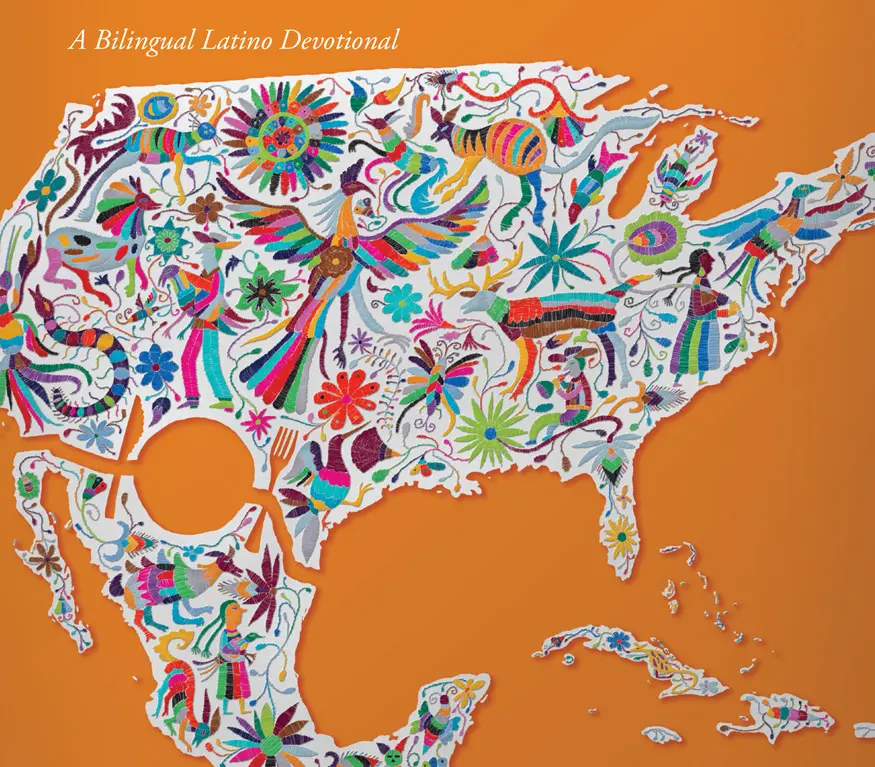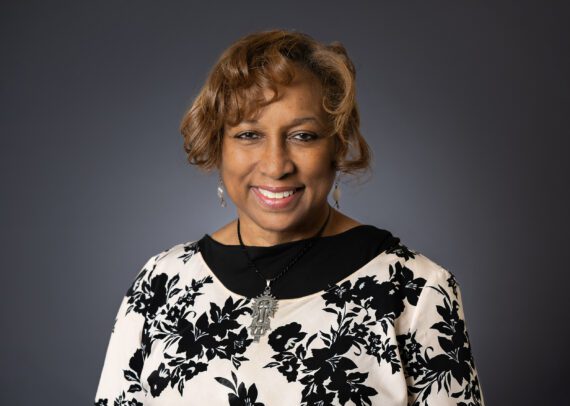Bread for the World is honored to present Finding Hope, Ending Hunger on Both Sides of the Border: A Bilingual Latino Devotional.
This devotional celebrates the hope, faith, and resilience of Latino communities, while also lamenting the evil of inequitable policies that, to this day, continue to oppress our people leading to hunger and poverty in the United States and south of the U.S.-Mexico border—even further exacerbated by the COVID-19 pandemic.
This devotional, written by and for Christian Latinos/as, seeks to inspire and empower individuals and churches to address the structural causes and negative consequences of hunger and poverty through faith and advocacy.
As we confront an uncertain future, our faith grounds us in God’s love for all people, ourselves, our family, and our community. This bilingual Latino devotional invites you to reflect biblically on the interconnectedness of hunger, malnutrition, and climate change, issues that negatively impact Latino communities in the United States and drive migration abroad.
Our devotional writers challenge us to feel the Spirit of God within us and to hear God’s urgent call to demand justice so all can put food on the table.
With the power and direction of the Holy Spirit, we know we can end hunger and poverty—systemic issues that are central to the Bible and the teachings of Jesus. We are committed to building a movement grounded in spiritual power so that we might be guided to the other side of this health crisis stronger and ready to rebuild our society in line with God’s vision of thriving and flourishing for all people.
To that end, we invite you to use these five devotional entries with your community of faith to reflect, pray, and act. Rooted in Christ, we can actively work against poverty by advocating for public policies that foster racial equity, shared prosperity, and opportunity for all.
Thank you for all you are doing to end hunger and poverty in our time.
Advocacy
Christians are bearers of good news and bad news. Our church’s theological tradition tends to sway us into one or the other. Some traditions overemphasize the proclamation of the “new heaven and new earth.” As if that were all of what God is concerned about. Others forget or ignore the promises of the “new Jerusalem, coming down out of heaven from God.” Since the fall of our original parents (according to) Genesis, God began a process of renewing humanity.
The first coming of Jesus inaugurated the beginning of the end of that process. Notice that this transformation or renewal is an ongoing process. The Spirit of God is actively using the church (and even those who do not identify with the church) to influence human institutions and demand justice due to all of God’s children.
The faith we have received from Jesus and the apostles reveals the principles of God’s reign and his will for humanity. We are a megaphone for God: “Neither do people light a lamp and put it under a bowl. Instead, they put it on its stand, and it gives light to everyone in the house” (Matthew 5:15). Those who know the heart of God cannot be satisfied with preaching about a future perfect life while people today are hungry, homeless, abused, enslaved, rejected, and killed.
We have been empowered and sent to the world to change the world so that all people can experience “fullness of life.” “The Spirit of the Lord is on me, because he has anointed me to proclaim good news to the poor” (Luke 4:18). We are the voice, the arms, and the feet of Christ in the world.
Demanding that our elected officials work for a world that provides the same care for all, equal opportunities and rights, is our responsibility. Advocacy is one powerful tool to proclaim the good news that God is setting the world aright.
Reflection: Do you fear the consequences of speaking up and engaging in advocacy to hold our elected officials accountable on issues related to hunger and poverty?
U.S. Hunger
As a pastor, I hear all about the sins that beset people like pride, greed, wrath, envy, lust, and gluttony. Interestingly, I have never heard anyone confess the sin of partiality.
James 2 talks about this often unknown, forgotten, ignored, or unseen sin. It is the type of partiality that believes that one group is superior or has more value than the other. It is a sinful distinction that denies the image of God in others. Partiality can seep into our lives in subtle ways and manifests itself in the choices we make, who we talk to, pay attention to, or care for.
Partiality exists when people struggling with hunger and malnutrition are ignored. Partiality reigns when people living in poverty are discounted and shunned. Sadly, partiality is seen all over the United States when nearly 37 percent of Latino households with children struggle to put food on the table. Thankfully, James provided the antidote to resisting partiality by reiterating the words of Jesus that we must love our neighbor as we love ourselves.
The church cannot allow itself to be plagued with the same vices as those in James’ day who let their selfish gains and desires outweigh love. When we love people as ourselves, we want for them what we want for ourselves. When we love our neighbor, we desire their flourishing and prosperity.
May we heed James’ words and “show no partiality as we hold the faith in our Lord Jesus Christ, the Lord of glory” (James 2:1).
Reflection: Have we unintentionally said to our brothers and sisters in need, “Go in peace, be warmed and filled,” without giving them the things they need for the body?
global hunger
In Proverbs, we find an exhortation to see, hear, and attend to the cries of those in need: “The generous will themselves be blessed, for they share their food with the poor” (Proverbs 22:9). But, we are also told to attend to their needs quickly: “Do not say to your neighbor, ‘Come back tomorrow, and I’ll give it to you’—when you already have it with you” (Proverbs 3:28).
In Matthew 14:15-21, Jesus cared for the basic needs of those who followed him as much as he cared for their spiritual needs. The disciples came to Jesus to ask him to let people leave to find something to eat, but Jesus’ surprising response was to “give them something to eat.” He invited his disciples to see the resources that were among them. It is from these resources, five loaves and two fish, that Jesus performed a miracle.
In some regions of Latin America, income inequities are quite significant. Some people do not even have a loaf of bread, while others have abundant food and resources.
The first 1,000 days—from a woman’s pregnancy to her child’s second birthday—are critical for a child’s development. However, too many children in Latin America die before reaching that milestone because they lack a nutritious diet. Now, the COVID-19 pandemic is exacerbating hunger and malnutrition in the region. As disciples, we are called to attend to the cry of people in need. Perhaps our five loaves and two fish are the answer to these children’s prayers.
Reflection: When was the last time you did not know when your next meal would be?
migration
In Matthew 7:24-27, we find Jesus utilizing a comparison of where one builds a house to teach the difference between wisdom and foolishness. Jesus speaks of the wise as those who build their house on rock, while the foolish build upon sand. But this scripture also speaks to the everyday realities of those who find themselves living in a house built upon sand due to no fault of their own and who strive to build a house on rock. One could reflect upon this scripture when thinking of those people who are forced to flee their homeland due to unstable living conditions.
At the root of migration are hunger and extreme poverty, amplified by violence and corruption. For individuals and families who have migrated to the United States, the idea of building a house on rock is much deeper than owning a physical building. Rather, it is about building a home, a safe space, that provides the ost stability and well-being.
It may look different from time to time, and may be shared with other families and friends during different seasons. It looks like a one bedroom apartment with two families working to make ends meet; it looks like the living room of a relative; it looks like the long road between Guatemala and the United States; it may even look like the hot concrete under a tarp at the Mexico-United States border.
The rock foundation is demonstrated in the resilience of parents and individuals who are willing to face the dangers of migration and the risk of rejection by a government blinded by political ideologies. It is demonstrated in their willingness to submit to less-than-humane working conditions and to accept unlivable wages.
Migration is a better option than staying to die in a country torn by war and poverty. But, the conditions that many migrants face are wrong and unjust. The foolishness in this reality represents those who perpetuate the sand-shifting foundation—the broken immigration system and those who exploit it, and the limited and unequal access to resources. There is enough for all: this is the solid rock foundation that brings hope to those who risk their very lives for just one piece. Here, true wisdom lives and builds.
Reflection: Where do you see the sand shifting under those who live in the margins due to their undocumented status?
climate change
From the early scripture passages (Genesis 2:15) to the last (Revelation 11:18), we hear a call and warning to care for God’s creation (Psalm 24:1). When we disrespect this call, the harmonious order under which God created life is threatened, and all creatures suffer the consequences (Jeremiah 14:2-7).
Although the story of Joseph (Genesis 37, 40-41), and the dreams of the Pharaoh of Egypt does not speak of a climate crisis like the one we are facing today, it certainly describes the reality of a region that will face major climate shifts. After seven years of hospitable climate that generates an abundance of food, there will be seven years of climate conditions that will create famine—unless people organize to mitigate its impact.
Like Joseph interpreting Pharaoh’s dreams, climate scientists today have interpreted climate data and warn us about coming fluctuations in temperatures, stronger storms, longer droughts, and floods. These are already affecting the planet’s biodiversity and the livelihoods of the most vulnerable human communities.
In Joseph’s story, people are receptive to the unprecedented revelation, and they organize themselves without delay to lessen the impact on everyone—not just the rulers. The passage does not explain to us why these changes in the environment will occur. Facing a situation that the God of the Hebrews cannot avoid, Joseph inspires his people to prepare the way so they—collectively—do not suffer unnecessarily.
The time of famine arrives as announced, but the well-being of all is preserved, thanks to a faithful God, and to the community effort of rulers, workers, religious leaders, peasants, and grain storekeepers. Each one of them, inspired by a common good that includes other people, does their part to avoid a major crisis.
When justice reigns on earth, God’s kindness is latent, even in the midst of crisis.
Reflection: What steps can you take to prepare and organize to change federal policy to better care for God’s creation?






